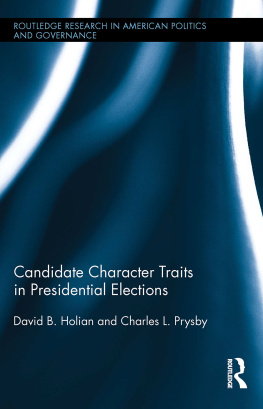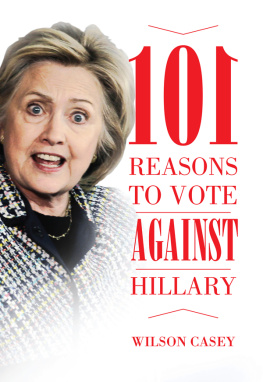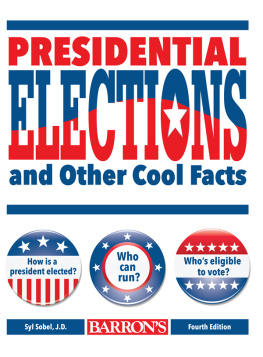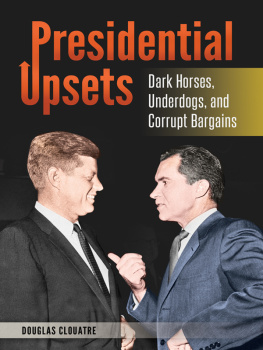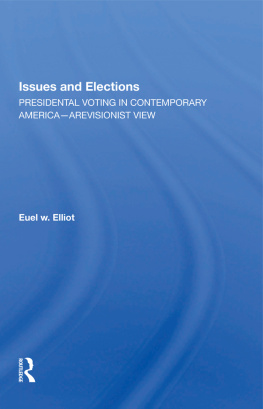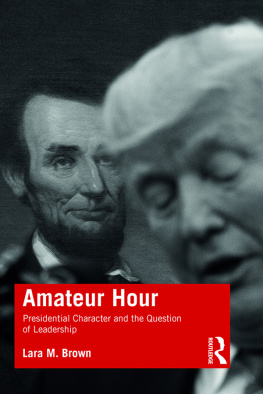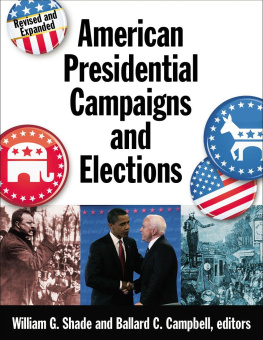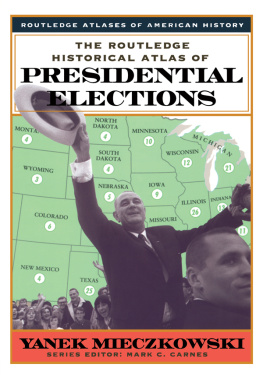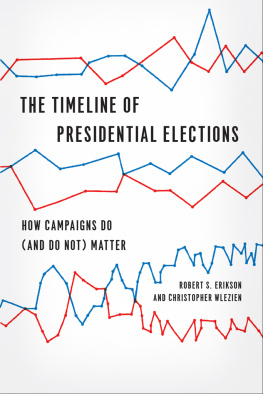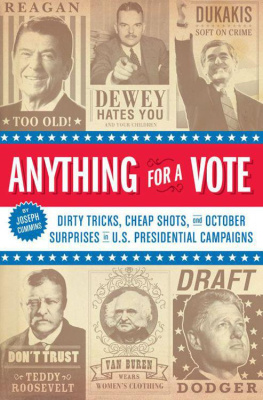Character Traits in Presidential Elections is an extraordinary analysis that contributes a new level of understanding to an area much discussed but relatively neglected by social scientists. The personal qualities and character perceptions of presidential candidates are assumed to affect voter decisionmaking. Precisely how and of what degree of importance compared to other influences has been a murky area for interpretation. This is no longer the case. Holian and Prysby assess how such qualities impact the vote; what shapes and influences the development of such attributes; and the type of voter most likely to perceive individual personalities as determined of the vote. They do it with style and an in-depth familiarity with their subjects that in itself provides a good read. This is an exceptionally sophisticated study, one that fills a major void in our analysis of voting behavior. It should be required reading for all students of elections and the forces that serve to shape the outcomes
William Crotty, Thomas P. ONeill Chair in Public Life and Professor of Political Science at Northeastern University
Everyone knows that candidate character matters in presidential elections but until now political scientists have not shown how, when and why it matters. This book by Charles Prysby and David Holian finally provides answers to these critical questions. It should be must reading for anyone interested in understanding the way American presidents are chosen.
Alan I. Abramowitz, Emory University
Candidate Character Traits in Presidential Elections
Voter perceptions of the personal traits of presidential candidates are widely regarded to be important influences on the vote. Media pundits frequently explain the outcome of presidential elections in terms of the personal appeal of the candidates. Despite the emphasis on presidential character traits in the media, the scholarly investigation in this area is limited.
In this book, David Holian and Charles Prysby set out to examine the effect that trait perceptions have on the vote, how these perceptions are shaped by other attitudes and evaluations, and what types of voters are most likely to cast a ballot on the basis of the character traits of the presidential candidates. Using the American National Election Studies (ANES) surveys, the authors find that traits do have a very substantial effect on the vote, that different candidates have advantages on different traits, and that the opinions expressed by media pundits about how the candidates are viewed by the voters are often simplistic, and sometimes quite mistaken. Character traits are important to voters, but we need a better and more complete understanding of how and why these factors influence voters.
An essential read which provides a clear and original argument to all those interested in furthering their understanding of the importance of candidate character traits for the quality of American elections and democracy.
David B. Holian is Associate Professor of Political Science at the University of North Carolina at Greensboro
Charles L. Prysby is Professor of Political Science at the University of North Carolina at Greensboro
Routledge Research in American Politics and Governance
1 Lobbying the New President
Interests in Transition
Heath Brown
2 Religion, Race, and Barack Obamas New Democratic Pluralism
Gastn Espinosa
3 Direct Democracy in the United States
Petitioners as a Reflection of Society
Edited by Shauna Reilly and Ryan M. Yonk
4 American Exceptionalism in the Age of Obama
Stephen Brooks
5 An Empire of Ideals
The Chimeric Imagination of Ronald Reagan
Justin D. Garrison
6 Resisting Injustice and the Feminist Ethics of Care in the Age of Obama
Suddenly,... All the Truth Was Coming Out
David A.J. Richards
7 Interfaith Advocacy
The Role of Religious Coalitions in the Political Process
Katherine E. Knutson
8 Social Contract Theory in American Jurisprudence
Too Much Liberty and Too Much Authority
Thomas R. Pope
9 Voting and Migration Patterns in the U.S.
George Hawley
10 Democracy, Intelligent Design, and Evolution
Science for Citizenship
Susan P. Liebell
11 Inventive Politicians and Ethnic Ascent in American Politics
The Uphill Elections of Italians and Mexicans to the U.S. Congress
Miriam Jimnez
12 Competitive Elections and Democracy in America
The Good, the Bad, and the Ugly
Heather K. Evans
13 Gender, Race, and Office Holding in the United States
Representation at the Intersections
Becki Scola
14 The Latino Gender Gap in U.S. Politics
Christina E. Bejarano
15 Perspectives on Presidential Leadership
An International View of the White House
Edited by Michael Patrick Cullinane and Clare Frances Elliott
16 Super PAC!
Money, Elections, and Voters after
Citizens United Conor M. Dowling and Michael G. Miller
17 White Voters in 21st Century America
George Hawley
18 Candidate Character Traits in Presidential Elections
David B. Holian and Charles L. Prysby
Candidate Character Traits in Presidential Elections
David B. Holian and Charles L. Prysby
First published 2015
by Routledge
711 Third Avenue, New York, NY 10017
and by Routledge
2 Park Square, Milton Park, Abingdon, Oxon OX14 4RN
Routledge is an imprint of the Taylor & Francis Group, an informa business
2015 Taylor & Francis
The right of the David B. Holian and Charles L. Prysby to be identified as the author of the editorial material, and of the authors for their individual chapters, has been asserted in accordance with sections 77 and 78 of the Copyright, Designs and Patents Act 1988.
All rights reserved. No part of this book may be reprinted or reproduced or utilized in any form or by any electronic, mechanical, or other means, now Known or hereafter invented, including photocopying and recording, or in any information storage or retrieval system, without permission in writing from the publishers.
Trademark Notice: Product or corporate names may be trademarks or registered trademarks, and are used only for identification and explanation without intent to infringe.
Library of Congress Cataloging-in-Publication Data
Holian, David B., 1967
Candidate character traits in presidential elections / David B. Holian and Charles L. Prysby.
pages cm. (Routledge research in American politics and governance; 18)
Includes bibliographical references and index.
1. Presidential candidatesUnited StatesPsychology. 2. Presidential candidatesUnited StatesPublic opinion. 3. PresidentsUnited States Election. 4. CharacterPolitical aspectsUnited States. 5. Political psychologyUnited States. 6. Voting researchUnited States. I. Prysby, Charles L. II. Title.
JK521.H65 2014
324.973001'9dc23
2014017013
ISBN: 978-1-138-78269-3
ISBN: 978-1-315-76908-0
Typeset in Sabon
by Apex CoVantage, LLC
For Heather
D.B.H.
Anita, Nicole, and Michelle
C.L.P.
Contents
One of the most interesting sources of variation from one presidential election to the next is the candidates themselves. In the post-war era, the two major political parties have conferred their nominations on a wide range of individuals, including: war heroes and those who went to great lengths to avoid war; sitting and former vice presidents; well-known and little-known governors; senators who barely served in the institution and senators who served with distinction for decades; ideologues and pragmatists; the righteous and the roguish; and, of course, a politically liberal B-movie actor turned corporate spokesman turned conservative, two-term California governor. Many fine biographies have attempted to capture the character of these candidates as they grew from childhood to adulthood and into political careers that led to winning or losing the White Houseand, in a few cases, winning and losing the White House.


